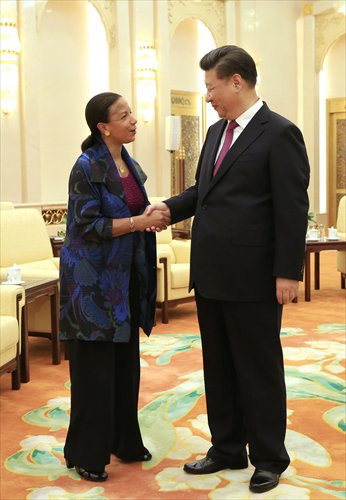China, US should respect each other’s core interests: Xi
Rice’s trip to Beijing first after arbitration, paves way for Obama visit

Chinese President Xi Jinping (right) shakes hands with US National Security Adviser Susan Rice during their meeting in Beijing on Monday. Rice will also fly to Shanghai to meet with business executives and Chinese citizens in a mission to "expand practical cooperation." Photo: AFP
China and the US should effectively manage their differences and respect each other's core interests, Chinese President Xi Jinping said on Monday during his meeting in Beijing with US National Security Advisor Susan Rice, the first visit by a senior US official after an arbitration court ruled against China's territorial claims in the South China Sea.
Also, China will not give in to any outside pressure on the South China Sea issue, Fan Changlong, a Central Military Committee vice chairman told Rice in a separate meeting in Beijing on Monday, and urged the US not to deploy the Terminal High Altitude Air Defense (THAAD) missile system in South Korea.
Experts said it is necessary for China to clearly express its national security stance to the US, as frank exchanges between the two countries are conducive to resolving strategic misunderstandings.
"China will not seek hegemony after becoming strong, nor does it intend to challenge the current international order and rules," said Xi at the Great Hall of the People in Beijing.
Common China-US interests outweigh their differences, Xi said, noting that both sides need greater mutual trust and cooperation.
Xi called on both sides to expand economic, trade and investment cooperation, as well as cooperation on climate change and international and regional affairs, to make pragmatic cooperation a "ballast" in China-US ties.
Experts believe part of Rice's mission during her visit from Sunday to Wednesday is to prepare the US President Barack Obama's meeting with Xi at the G20 summit in East China's Hangzhou in September.
During Monday's meeting with Rice, Xi stressed he looks forward to meeting Obama in Hangzhou, and China and the US, as the two largest economies in the world, should join hands to drive the G20 summit toward positive results.
Positive sign
While confirming positive developments in the two countries' military exchanges in recent years, Fan told Rice that China's stance in the South China Sea issue remains unshakable.
"China will not accept or recognize the so-called arbitration ruling, the Chinese people will never give in to any outside pressure, and the Chinese military will resolutely protect the country's territorial sovereignty and security," Fan noted.
Fan also said that if the US is determined to deploy the THAAD system in South Korea, it will directly hurt China's strategic security, worsen tensions on the Korean Peninsula and seriously impact on Sino-US mutual trust.
"The US must stop such a wrong act," he told Rice.
Jin Canrong, deputy director of the Center of American Studies at the Renmin University of China, said Rice's visit and her meeting with President Xi and China's senior military and government officials amid disputes is a positive sign, which also shows that the US attaches great importance to bilateral ties.
"The visit will help the two sides reduce suspicions and carry on with their cooperation projects," Jin told the Global Times on Monday.
"To alleviate pressure on the two countries' militaries, it is necessary for China to clearly and firmly tell the US about its stance," he added.
Admitting the two sides face "challenges and differences," Rice emphasized the positive side of the two militaries on Monday.
"Right now our forces are operating with each other in the Rim of the Pacific exercise just as they have in the past in the Gulf of Aden and elsewhere," Rice said. "Our military leaders communicate more frequently and directly than ever before."
"While our forces operate in closer proximity with each other, the risk of unintended consequences has dropped, thanks to confidence-building measures that our two sides have put in place," Rice said, according to documents sent by the US Embassy.
Wu Xinbo, director of the Center for American Studies at Fudan University, said China wants to use the chance to tell the US not to hype The Hague's ruling against China on the South China Sea disputes, and to stop its show of force in this region and incite other countries to pressure China on the disputes.
Rice's visit is also expected to boost economic and trade cooperation, as well as on climate change, a significant political heritage of Obama's eight years in office, he added.